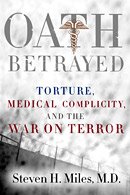How Doctors Got Into the Torture Business

Andrew Sullivan on the harrowing new book "Oath Betrayed", in which a medical ethicist documents how members of his profession got caught up in the abuse of prisoners
By ANDREW SULLIVAN
Posted Friday, Jun. 23, 2006
Soldiers are trained to kill and doctors to heal. At least that's how we usually understand those two professions. But wars can often distort reality, and the war on terrorism has turned into a test case. An inspiring example is that of Colonel Kelly Faucette, M.D. He recently wrote about caring for a new patient at the intensive-care unit of the 47th Combat Support Hospital in Mosul, Iraq. The patient was a terrorist insurgent, a man who planted hidden roadside bombs to murder civilians and Faucette's fellow soldiers. Faucette wrote in his local paper: "Something inside me wants to walk up to this guy ... and just clobber him." But Faucette didn't. Instead he healed him before sending him to a jail, and by that act of healing he helped heal Iraq.
That's the America I know and love. But it is not, alas, the only face of America in this war. One of Defense Secretary Donald Rumsfeld's first instructions for military interrogations outside the Geneva Conventions was that military doctors should be involved in monitoring torture. It was a fateful decision — and we learn much more about its consequences in a new book based on 35,000 pages of government documents obtained under the Freedom of Information Act. The book is called Oath Betrayed (to be published June 27) by medical ethicist Dr. Stephen Miles, and it is a harrowing documentation of how the military medical profession has been corrupted by the Bush-Rumsfeld interrogation rules.
One of those rules was that a prisoner's medical information could be provided to interrogators to help guide them to the prisoner's "emotional and physical strengths and weaknesses" (in Rumsfeld's own words) in the torture process. At an interrogation center called Camp Na'ma, where the unofficial motto was "No blood, no foul," one intelligence officer testified that "every harsh interrogation was approved by the [commander] and the Medical prior to its execution." Doctors, in other words, essentially signed off on torture in advance. And they often didn't inspect the victims afterward. At Abu Ghraib, according to the Army's surgeon general, only 15% of inmates were examined for injuries after interrogation.
Some of the medical involvement in torture defies belief. In one of the few actual logs we have of a high-level interrogation, that of Mohammed al-Qhatani (first reported in TIME), doctors were present during the long process of constant sleep deprivation over 55 days, and they induced hypothermia and the use of threatening dogs, among other techniques. According to Miles, Medics had to administer three bags of medical saline to Qhatani — while he was strapped to a chair — and aggressively treat him for hypothermia in the hospital. They then returned him to his interrogators. Elsewhere in Guantánamo, one prisoner had a gunshot wound that was left to fester during three days of interrogation before treatment, and two others were denied antibiotics for wounds. In Iraq, according to the Army surgeon general as reported by Miles, "an anesthesiologist repeatedly dropped a 2-lb. bag of intravenous fluid on a patient; a nurse deliberately delayed giving pain medication, and medical staff fed pork to Muslim patients." Doctors were also tasked at Abu Ghraib with "Dietary Manip (monitored by med)," in other words, using someone's food intake to weaken or manipulate them.
Of the 136 documented deaths of prisoners in detention, Miles found, medical death certificates were often not issued until months or even years after the actual deaths. One prisoner's corpse at Camp Cropper was kept for two weeks before his family or criminal investigators were notified. The body was then left at a local hospital with a certificate attributing death to "sudden brainstem compression." The hospital's own autopsy found that the man had died of a massive blow to the head. Another certificate claimed a 63-year-old prisoner had died of "cardiovascular disease and a buildup of fluid around his heart." According to Miles, no mention was made that the old man had been stripped naked, doused in cold water and kept outside in 40° cold for three days before cardiac arrest.
Other doctors just looked the other way, their military duty overruling the Hippocratic Oath. One at Abu Ghraib intervened to ask guards to stop beating one prisoner's wounded leg and quit hanging him from an injured shoulder. He saw it happen three times. He never reported it. In Mosul, according to Miles, one medic witnessed guards beating a prisoner and burning him by dragging him over hot stones. The prisoner was taken to the hospital, treated and then returned by doctors to his torturers. An investigation into the incidentwas closed because the medic didn't sign the medical record and so he couldn't be identified.
After a while, you get numb reading these stories. They read like accounts of a South American dictatorship, not an American presidency. But we learn one thing: once you allow the torture of prisoners for any reason, as this President did, the cancer spreads. In the end it spreads to healers as well, and turns them into accomplices to harm.
Link Here




0 Comments:
Post a Comment
<< Home